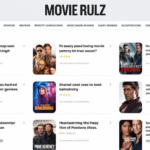Introduction: Why Rotten Tomatoes Reigns Supreme in Entertainment
In the fast-paced world of entertainment, where countless movies and TV shows vie for attention, Rotten Tomatoes stands as a beacon of clarity. This iconic platform has transformed how audiences make viewing choices, offering a unique blend of critic and audience reviews that deliver unparalleled insight. With its signature Tomatometer and user-friendly design, Rotten Tomatoes has become synonymous with trust and reliability. Whether you’re a casual viewer or a cinephile, Rotten Tomatoes empowers you to navigate the vast landscape of content with confidence. Let’s dive into why Rotten Tomatoes remains the ultimate authority in film and television critique.
Table of Contents
What Is Rotten Tomatoes?
Rotten Tomatoes is a premier online review-aggregation platform launched in 1998, designed to provide a snapshot of critical and audience opinions on movies and TV shows. The name “Rotten Tomatoes” playfully nods to the old tradition of throwing tomatoes at subpar performances, but the site is anything but outdated. It compiles reviews from accredited critics and everyday viewers, distilling them into easy-to-understand metrics like the Tomatometer and Audience Score. Rotten Tomatoes doesn’t just summarize opinions—it shapes viewing habits by highlighting what’s worth watching and what might be a miss.
The Power of the Tomatometer
At the heart of Rotten Tomatoes lies the Tomatometer, a percentage score reflecting the proportion of positive reviews from professional critics. A score of 60% or higher earns a “Fresh” rating, while anything below is deemed “Rotten.” This simple yet effective system has made Rotten Tomatoes a household name. For instance, a blockbuster like Avengers: Endgame might boast a 94% Fresh rating, signaling critical acclaim, while a poorly received film could languish in Rotten territory. The Tomatometer’s clarity ensures Rotten Tomatoes remains a trusted guide for millions seeking quality entertainment.
How Rotten Tomatoes Curates Reviews
Rotten Tomatoes doesn’t rely on just anyone’s opinion. It carefully selects reviews from approved critics, including journalists, columnists, and entertainment experts affiliated with reputable outlets. These reviews are then categorized as positive or negative, contributing to the Tomatometer score. Additionally, Rotten Tomatoes includes user reviews, allowing everyday fans to weigh in with their own ratings. This dual approach—professional and public—sets Rotten Tomatoes apart, creating a balanced perspective that resonates with diverse audiences. By maintaining strict standards, Rotten Tomatoes ensures its scores reflect genuine critical and cultural sentiment.
The Audience Score: Giving Viewers a Voice
Beyond the Tomatometer, Rotten Tomatoes amplifies the voice of everyday viewers through its Audience Score, often displayed as a popcorn bucket icon. This metric reflects user ratings on a five-star scale, offering a grassroots perspective on a title’s reception. For example, a movie might have a lukewarm Tomatometer score but a glowing Audience Score, suggesting it resonates more with fans than critics. Rotten Tomatoes’ inclusion of this feature fosters a democratic space where everyone’s opinion matters, making it a vital tool for gauging a title’s broad appeal.
Why Rotten Tomatoes Matters in 2025
In an era dominated by streaming platforms like Netflix, Hulu, and Disney+, Rotten Tomatoes is more relevant than ever. With thousands of titles available at the click of a button, decision fatigue is real. Rotten Tomatoes cuts through the noise, offering concise evaluations that help viewers choose wisely. Whether you’re deciding between a critically acclaimed indie film or a trending series, Rotten Tomatoes provides the context needed to make informed decisions. Its influence extends beyond casual viewing—it shapes industry trends, impacts box office performance, and even sways awards season buzz.
Rotten Tomatoes and the Streaming Revolution
The rise of streaming has reshaped entertainment, and Rotten Tomatoes has adapted seamlessly. The platform now covers not only theatrical releases but also exclusive streaming content, from Amazon Prime’s The Boys to Apple TV+’s Ted Lasso. Rotten Tomatoes aggregates reviews for these titles, ensuring viewers can assess their quality before committing hours to a binge. By categorizing content by platform, genre, and rating, Rotten Tomatoes simplifies the search for the next great watch, cementing its role as an indispensable companion in the streaming age.
The Impact of Rotten Tomatoes on Filmmakers and Studios
Rotten Tomatoes wields significant influence over the entertainment industry. A high Tomatometer score can boost a film’s visibility, drive ticket sales, or increase streaming numbers, while a Rotten rating might spell trouble. Studios often monitor Rotten Tomatoes closely, using its metrics to gauge audience reception and refine marketing strategies. For independent filmmakers, a Fresh rating on Rotten Tomatoes can be a game-changer, elevating lesser-known projects to must-watch status. This dynamic underscores Rotten Tomatoes’ power to shape cultural conversations around film and TV.
Navigating Rotten Tomatoes: Tips for Users
To get the most out of Rotten Tomatoes, understanding its features is key. Start by exploring the Tomatometer and Audience Score for a balanced view. Dive into critic reviews for in-depth analysis or skim user comments for relatable takes. Rotten Tomatoes also offers curated lists, like “Top 100 Movies” or “Best TV Shows of 2025,” perfect for inspiration. Filters allow you to sort by genre, release date, or platform, making it easy to find content tailored to your tastes. With Rotten Tomatoes, discovering your next favorite movie or show is effortless.
Rotten Tomatoes’ Role in Pop Culture
Rotten Tomatoes has transcended its role as a review site to become a pop culture phenomenon. Its scores are referenced in talk shows, social media debates, and even movie trailers. Phrases like “Certified Fresh” have entered the lexicon, signaling quality to audiences worldwide. Rotten Tomatoes also hosts podcasts, video content, and editorial features that dive deeper into entertainment trends, further embedding it in the cultural zeitgeist. By bridging critics and fans, Rotten Tomatoes fosters a shared language for discussing what we watch.
Criticisms and Controversies Surrounding Rotten Tomatoes
No platform is without scrutiny, and Rotten Tomatoes has faced its share. Some argue the Tomatometer oversimplifies complex reviews, reducing nuanced opinions to binary scores. Others claim it amplifies groupthink among critics or inflates audience biases through user ratings. In rare cases, studios have accused Rotten Tomatoes of unfairly impacting a film’s success. However, Rotten Tomatoes counters by emphasizing transparency in its methodology and commitment to diverse voices. These debates only highlight Rotten Tomatoes’ influence, as its scores continue to spark conversation and drive engagement.
How Rotten Tomatoes Stays Ahead in a Competitive Landscape
With competitors like IMDb and Metacritic in the mix, Rotten Tomatoes maintains its edge through innovation and accessibility. Its clean interface, mobile app, and integration with platforms like X make it a go-to resource. Rotten Tomatoes also evolves with the times, expanding coverage to include gaming and podcasts while refining its algorithms for accuracy. By prioritizing user experience and editorial integrity, Rotten Tomatoes ensures it remains the gold standard for review aggregation in 2025 and beyond.
The Future of Rotten Tomatoes
As entertainment evolves, so does Rotten Tomatoes. The platform is poised to embrace emerging trends, from virtual reality cinema to interactive streaming formats. Rotten Tomatoes could expand its metrics to include social media sentiment or AI-driven recommendations, further personalizing the user experience. Partnerships with streaming giants or festivals might enhance its reach, while continued focus on diverse critics will keep its perspective fresh. Whatever the future holds, Rotten Tomatoes will likely remain a cornerstone of how we evaluate and enjoy media.
Conclusion: Rotten Tomatoes as Your Entertainment Compass
Rotten Tomatoes is more than a review site—it’s a cultural institution that empowers viewers, informs creators, and shapes the entertainment landscape. Its blend of critical insight, audience feedback, and user-friendly design makes it an essential tool for navigating the endless stream of movies and TV shows. In 2025, as content options multiply, Rotten Tomatoes stands out as a trusted guide, helping you find stories that resonate. Whether you’re chasing a Certified Fresh gem or curious about a trending series, Rotten Tomatoes is your compass for discovering entertainment that matters. Dive in, explore, and let Rotten Tomatoes lead the way.








